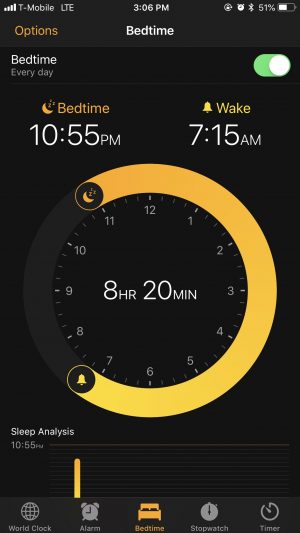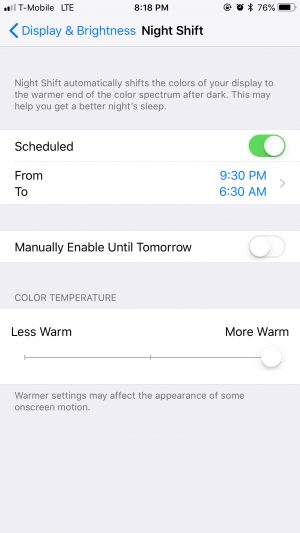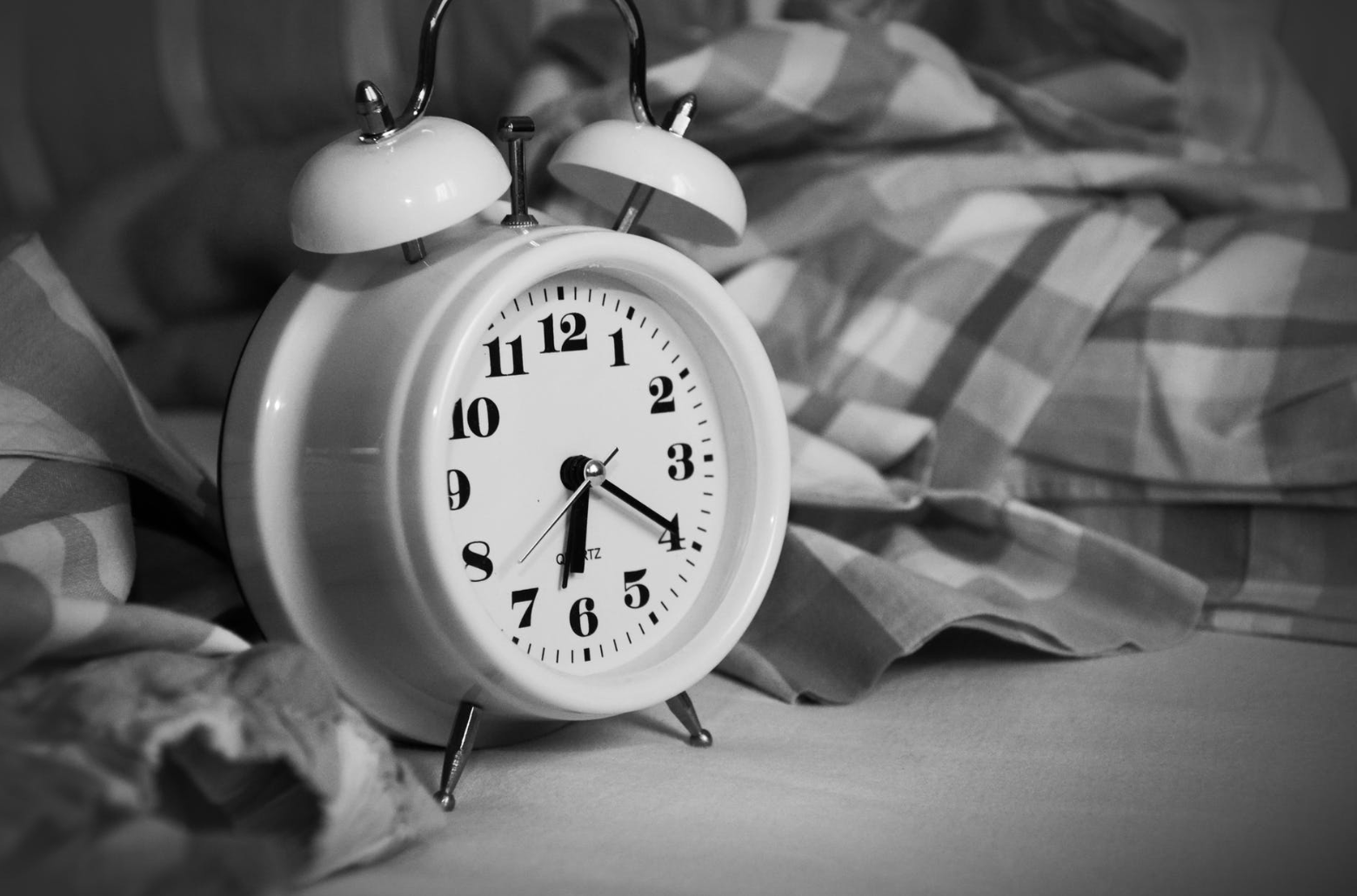Yes, you read that right. Get more work done by optimizing your sleep. It seems counter-intuitive, but it’s true. I remember during medical school, I would joke with my classmates that I wish I didn’t have to sleep as much as I did, because I would be able get more work done that way. But, the more I would I cut into my sleep, the more I struggled with getting stuff done.
I find that so many people see sleep as a weakness — something that can be powered through and caffeinated over. But, contrary to popular belief, sleep optimization can not only give you enough energy to accomplish your daily tasks and goals, it can help optimize your overall health, including balancing your mood and even help you achieve your fitness goals. So, if you want to accomplish more, whether it be an item on that to do list or on that bucket list, without sacrificing your sleep, read on.
Why Sleep is Important:
Studies have associated good sleep with productivity, cognition, improved mood and optimal overall health and poor sleep with diabetes, coronary heart disease, stroke and even early death.11
-
Lack of sleep has been found to impair you to the same extent as alcohol.
A study conducted by the School of Psychology in Sydney, Australia and the New Zealand Occupational and Environmental Health Research Centre showed that commonly experienced levels of sleep deprivation depressed performance to a level equivalent to that produced by alcohol intoxication of a blood alcohol content [BAC] of 0.05%. For reference, the legal alcohol limit in most states in America is 0.08% [the BAC limit for commercial drivers is 0.04%] “Sleep-deprived individuals tend to take longer to respond to stimuli. Tasks that rely on higher cognitive functions are also significantly affected [by sleep deprivation], even after a single night.”1
-
Sleep deprivation can negatively affect your mood.
“Sleep deprivation may result in a mental status that resembles depression or anxiety…These symptoms often disappear when normal sleep is restored.” 1
What’s more, a growing body of evidence shows ties between sleep deprivation and suicidality.2
If you look at the fact that almost 20% of the general U.S. population is afflicted with anxiety every year and that that major depressive disorder is the leading cause of disability in the U.S. for people 15 to 45 years old, this association can be pretty impactful.3 -
Sleep deprivation may be making you fat.
Studies have associated sleep deprivation with obesity: In a study published in the Annals of Internal Medicine, participants were placed on moderate calorie restriction diets and different sleep schedules. The group that received 5.5 hours of sleep per night, during the study, lost 55% less weight than those who received 8.5 hours of sleep per night. In addition, the sleep-deprived participants cited feeling hungrier and had less energy to exercise compared to their well-rested counterparts.4
Another study conducted by the Clinical Research Center of The University of Chicago sleep restriction, showed that sleep restriction, when compared with sleep extension, was associated with an overall decrease in serum leptin (a hormone that decreases appetite) and an increase in serum ghrelin (a hormone the stimulates appetite).5
Personally, I notice that when I have a sleep deficit, even if my work outs are intense, it is more difficult for me to reach my fitness goals. -
Chronic sleep loss is associated with a decreased ability to fight off infection.
Chronic sleep loss is associated with an increase in inflammatory markers and immunodeficiency.6
-
Sleep deprivation has been linked to increased mortality.
Chronic sleep deprivation is associated with an increased risk of diabetes, cancer, and mortality (death). In fact, both short sleep and long sleep are associated with increased all-cause mortality and is recognized as a risk factor for adverse cardio-metabolic profiles and outcomes. So, try not to get too much sleep or too little.7
How much sleep should you be getting?
Now that it’s apparent just how important sleep is, how do you improve yours? Feeling well-rested depends not just sleep duration, but also on the quality of sleep you’re getting.
Sleep Quantity [The Amount of Sleep Your Body Needs]
Though this changes as we age and varies from person to person, the American Academy of Sleep Medicine and the Sleep Research Society have the following general recommendations for sleep quantity based on age:8
| Age Group | Recommended Hours of Sleep Per Day | |
|---|---|---|
| Infant | 4-12 months | 12-16 hours per 24 hours (including naps) |
| Toddler | 1-2 years | 11-14 hours per 24 hours (including naps) |
| Preschool | 3-5 years | 10-13 hours per 24 hours (including naps) |
| School Age | 6-12 years | 9-12 hours per 24 hours |
| Teen | 13-18 years | 8-10 hours per 24 hours |
| Adult | 18-60 years | 7 or more hours per night |
These are general guidelines, but, again, the amount of sleep each person requires will differ from person to person. One approach to help you determine just how much sleep you need is to see how alert you feel after different durations of sleep. If you wake up, consistently feeling refreshed and capable of moving through the day feeling alert without effort, even when placed in boring or monotonous situations after a certain amount of sleep, without the need for “makeup sleep” later in the week, that is the duration of sleep that your body needs to perform at its best.7
Alternative methods to help you determine how much sleep your body needs can be found here].9
If you haven’t been getting the appropriate amount of of sleep for a while, you may find yourself having to sleep more for a brief time, in order to make up for that “debt” before finding its natural patterns. 9
Sleep quality is important, too.
In addition to sleeping enough hours, the quality of your sleep [which is defined as sleep efficiency and low sleep fragmentation] is important. To help with that, I’m going to segway into some habits to improve your sleep:
Habits to improve your sleep8, 10
- Be consistent. Go to bed at the same time each night and get up at the same time each morning, including on the weekends. I like to set an alarm that reminds me to go to bed. And when you do wake up, get out of bed. Don’t remain there.

- Make sure your bedroom is quiet, dark, relaxing, and at a comfortable temperature. It may be helpful to incorporate this into a bedtime routine of personal care, lights out and reduced noise up to two hours before desired sleep time. You can use blackout curtains (I, personally, love a silk sleep mask.)/ear plugs/sound machines to help decrease interruptive stimuli.
- Remove electronic devices, such as TVs, computers, and smart phones, from the bedroom, or at least keep them on the other side of your room and away from easy access, as blue screens can suppress natural melatonin production, resulting in difficulty falling asleep. Instead, wind down with quieter activities, like reading a book [not on your bed] or self-care with a nighttime routine. While I don’t recommend electronics/blue screens prior to bed, if it’s difficult for you to eliminate them completely, there is a nighttime feature on most new devices that will warm up the color of your screen (less blue light) and dim the lighting which can be set start at a certain time. [On iPhone: Launch Settings from your Home screen. Tap Display & Brightness. Tap Night Shift. Set time and level of warmth. On Mac: 1. click on Apple icon in the menu bar (top right of your computer screen). 2. Select System Preferences. 3. Choose “Displays” icon. 4. Select the Night Shift tab. 5. Set time. This can also be enabled on android devices and Windows.]

-
- If you have trouble sleeping at night, avoid naps, especially in the late afternoon. However, short naps lasting approximately 20 minutes can help alleviate daytime fatigue, sleepiness, and naps may be beneficial for shift workers. Naps longer than 30 minutes are more likely to affect your quality of sleep.
-
- Avoid caffeine after 1-2pm. Some people may be slow metabolizers of caffeine, and caffeine greatly affects their ability to fall asleep at night. If you notice that about yourself, avoid caffeine after 11am or 12pm.
-
- Avoid large meals before bedtime.
-
- Avoid alcohol before bedtime. While alcohol may make it easier for you to fall asleep, it negatively affects the normal circadian pattern of sleep and wakefulness–i.e. how well you sleep.
-
- Avoid tobacco/nicotine.
-
- Get some exercise. Being physically active during the day [at least 3-4 hours before bed] can help you fall asleep more easily at night.
-
- Sleep on a comfortable mattress and pillows.
-
- Regular bright light exposure during normal daytime hours may help to maximize alertness during the day and maintain a regular circadian rhythm. So, try and get outside for a bit of time each day.
-
- Avoid cutting into your sleep. More often than not, that movie/show or even that task can wait until the following day.
- Deal with all stress/problems before bed, whenever possible.
Signs of poor sleep quality include feeling fatigued even after getting enough sleep, repeatedly waking up during the night, and having symptoms of sleep disorders (such as snoring or gasping for air). Better sleep habits may improve the quality of your sleep, but if you have symptoms of a sleep disorder, such as snoring or being very sleepy during the day after a full night’s sleep, be sure to see your doctor and discuss your symptoms, as there may be other causes of your daytime sleepiness.8
Like all lifestyle changes, working on your sleep habits is a process. There are some nights when I just wanna stay up late and watch a movie, and I do. But when I do, I notice that my sleep is poorer because of it, and even one night of poor sleep affects me the following day (which is, actually, consistent with the aforementioned studies). In the end, sleep deprivation is not only unhealthy, but makes you perform at a fraction of what you’re capable of, and it makes everything you do less enjoyable.12 So, get your sleep, and be healthier and more productive because of it. Now, that is recommendation that I can get behind. I hope this article helps. Please, let me know if you have any questions in the comments, below.
*There are many potential causes of daytime sleepiness. If you have any specific questions or concerns about daytime sleepiness, sleep hygiene or any medical matter you should consult your doctor or other professional healthcare provider. If you think you may be suffering from any medical condition you should seek immediate medical attention. You should never delay seeking medical advice, disregard medical advice, or discontinue medical treatment because of information on www.livinglisted.com. You must not rely on the information on livinglisted.com as an alternative to medical advice from your doctor or other professional healthcare provider.
Citations
1. Williamson, A M, and Anne-Marie Feyer. “Moderate Sleep Deprivation Produces Impairments in Cognitive and Motor Performance Equivalent to Legally Prescribed Levels of Alcohol Intoxication.” National Center for Biotechnology Information, 15 June 2000, www.ncbi.nlm.nih.gov/pmc/articles/PMC1739867/pdf/v057p00649.pdf.
2. Bernert, Rebecca A, and Joiner, Thomas E. “Sleep disturbances and suicide risk: A review of the literature.” Neuropsychiatric Disease and Treatment, 03 December 2007, https://www.ncbi.nlm.nih.gov/pmc/articles/PMC2656315/.
3. “Facts & Statistics.” Anxiety and Depression Association of America, ADAA, adaa.org/about-adaa/press-room/facts-statistics.
4. Nedeltcheva, Arlet V., et al. “Insufficient Sleep Undermines Dietary Efforts to Reduce Adiposity.” Annals of Internal Medicine, American College of Physicians, 5 Oct. 2010, annals.org/aim/article-abstract/746184/insufficient-sleep-undermines-dietary-efforts-reduce-adiposity.
5. Spiegel, K, et al. “Brief Communication: Sleep Curtailment in Healthy Young Men Is Associated with Decreased Leptin Levels, Elevated Ghrelin Levels, and Increased Hunger and Appetite.” National Center for Biotechnology Information, Annals of Internal Medicine, 7 Dec. 2004, www.ncbi.nlm.nih.gov/pubmed?term=15583226.
6. Besedovsky, L, et al. “Sleep and Immune Function.” Sleep and Immune Function., Pflugers Archive , Jan. 2012, www.ncbi.nlm.nih.gov/pubmed?term=22071480.
7. Cirelli, Chiara MD, PhD. “Insufficient Sleep: Definition, Epidemiology, and Adverse Outcomes.” Edited by Ruth Benca MD, PhD and April F Eichler, MD, MPH, UpToDate, UpToDate, 25 Sept. 2018, www.uptodate.com/contents/insufficient-sleep-definition-epidemiology-and-adverse-outcomes?topicRef=97866&source=see_link.
8. “Are You Getting Enough Sleep?” Centers for Disease Control and Prevention, Centers for Disease Control and Prevention, 13 Mar. 2018, www.cdc.gov/features/sleep/index.html.
9. “Assess Your Sleep Needs.” Benefits of Sleep | Healthy Sleep, 15 Dec. 2008, healthysleep.med.harvard.edu/need-sleep/what-can-you-do/assess-needs.
10. Arnedt, J Todd PhD. “Insomnia in Patients with a Substance Use Disorder.” Edited by Ruth Benca MD, PhD and April F Eichler MD, MPH, UpToDate, UpToDate, 23 Aug. 2018, www.uptodate.com/contents/insomnia-in-patients-with-a-substance-use-disorder?sectionName=Alcohol&topicRef=7691&anchor=H5772997&source=see_link#H5772997.
11. Maski, Kiran MD. “Insufficient Sleep: Definition, Epidemiology, and Adverse Outcomes.” Edited by Thomas E Scammell MD and April F Eichler MD, MPH, UpToDate, UpToDate, 15 Aug. 2018, https://www.uptodate.com/contents/insufficient-sleep-evaluation-and-management?search=sleep%20hygeine&source=search_result&selectedTitle=1~150&usage_type=default&display_rank=1


Camille
28 Dec 2018Great article Saba! I relate to when you were in medical school and wished you didn’t have to sleep so much so you could get more done. But I’ve discovered my brain is useless without a good night’s sleep, so I prioritize that above all else. Thanks for sharing!